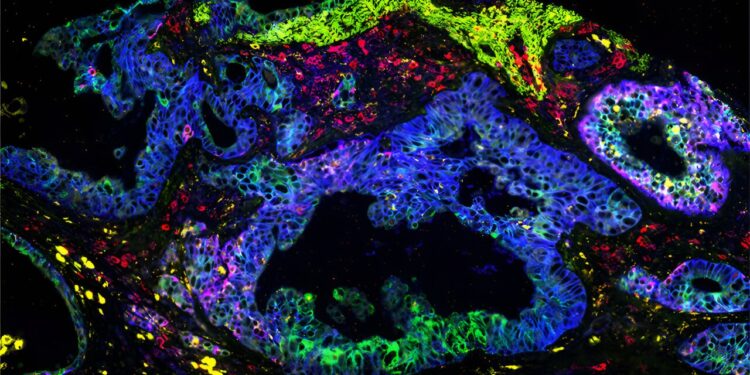Spatial molecular profiling of resected pancreatic adenocarcinoma. Fluorescently labeled probes bind to RNA targets to identify the location of different cell types in a tumor sample. Credit: Parc Jiwoon / Rohit Chandwani
A common KRAS gene mutation is associated with improved overall survival in pancreatic ductal adenocarcinoma (PDAC) compared to other variants, in part because the mutation appears to lead to less invasiveness and lower biological activity , according to a multicenter study conducted at Weill Cornell Medicine, NewYork-Presbyterian, Memorial Sloan Kettering Cancer Center and other institutions.
The research, published August 29 in Cancer celldemonstrates that KRAS mutations, which occur in approximately 95% of people with PDAC, can vary, with KRAS-G12R, KRAS-G12D, and KRAS-G12V being the most common alleles, and can provide doctors with valuable information about prognosis patients.
“We found that there are significant differences between these mutations,” said Dr. Rohit Chandwani, senior author of the paper, assistant professor in the Departments of Surgery and Cellular and Developmental Biology, and Mildred L. and John Research Fellow. F. Rasweiler in oncology. Research at Weill Cornell Medicine. Based on this information, “we suggest that clinical guidelines be revised to recommend routine molecular testing in all patients with pancreatic cancer.” »
Current National Comprehensive Cancer Network guidelines recommend molecular profiling for patients with advanced, locally advanced, or metastatic pancreatic cancer, but not for early-stage patients whose cancer is confined to the pancreas.
Understanding how mutations affect the behavior of pancreatic tumors could potentially help guide treatment, said Dr. Chandwani, who is also a surgical oncologist at NewYork-Presbyterian/Weill Cornell Medical Center.
Dr. Caitlin McIntyre, a fellow at Memorial Sloan Kettering at the time of the study, and Dr. Adrien Grimont, a postdoctoral associate at Weill Cornell Medicine at the time of the study, were co-first authors of the paper.
A Deep Dive into Pancreatic Cancer
Pancreatic ductal adenocarcinoma accounts for more than 80% of pancreatic cancer cases, according to the National Cancer Institute. Overall, pancreatic cancer has a 5-year survival rate of approximately 13%, making it one of the deadliest malignancies. In the United States, approximately 66,000 people will be diagnosed with the disease in 2024, according to the American Cancer Society.
To better understand early-stage and late-stage pancreatic cancer outcomes and their molecular underpinnings, the research team studied de-identified data from 1,360 patients who had pancreatic tumors removed at Memorial Sloan Kettering. Twenty-nine percent had early-stage cancer, meaning the cancer is confined to the pancreas, and 71% had late-stage tumors that had spread. Genomic sequencing was performed in the tumors of 397 patients to identify genetic mutations associated with PDAC.
Researchers also evaluated tumors from 20 patients from NewYork-Presbyterian/Weill Cornell Medical Center and Weill Cornell Medicine using spatial transcriptomics, a sophisticated method for studying where gene expression occurs in tumor tissue. . RNA sequencing was used to study genetic activity in 100 tumors from patients at the Ontario Cancer Research Institute. Patient consent and privacy were protected in all cases. The investigators then validated their findings on genetic mutations using mouse models.
Tumor KRAS Variations Affect Outcomes
Researchers found that KRAS-G12D, the most common mutation occurring in 35% of patients in the study, was associated with aggressive cancer and worse outcomes. The variant was also associated with increased rates of distant recurrence or metastatic disease occurring after surgery to remove a tumor. Although further study is needed, patients with tumors with these types of mutations could potentially benefit from chemotherapy as part of their treatment plan, Dr. Chandwani said.
KRAS-G12V, present in approximately 30% of patients, was associated with better overall survival, as was KRAS-G12R, present in 15% of patients.
“KRAS-G12R is unique in that it is a mutation that appears to occur only in pancreatic cancer and not in other types of cancer associated with KRAS mutations, such as lung cancer,” said Dr. Chandwani, who is also a member of the Sandra and Edward Meyer Cancer Center and the Englander Institute for Precision Medicine at Weill Cornell Medicine.
Additionally, KRAS-G12R was associated with increased recurrence rates in and around where a pancreatic resection was performed. Patients whose tumors had this mutation could potentially benefit from radiotherapy, which is a local treatment, to reduce the risk of local recurrence. Additional studies are needed to evaluate this strategy, the investigators noted.
“When we approach the treatment of these patients, we must be aware of their underlying KRAS mutations and aim to base our treatments on a thorough understanding of the patient- and tumor-specific factors that determine the risk associated with various clinical outcomes.” , said Dr Chandwani. . “This is an important next step.”
More information:
Caitlin A. McIntyre et al, Distinct clinical findings and biological characteristics of specific KRAS mutants in human pancreatic cancer, Cancer cell (2024). DOI: 10.1016/j.ccell.2024.08.002
Provided by Weill Cornell Medical College
Quote: Researchers develop knowledge of KRAS mutations in pancreatic cancers (October 2, 2024) retrieved October 2, 2024 from
This document is subject to copyright. Except for fair use for private study or research purposes, no part may be reproduced without written permission. The content is provided for informational purposes only.



